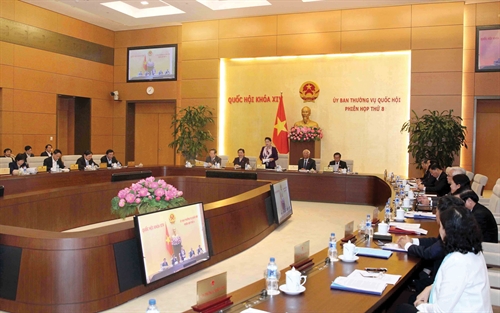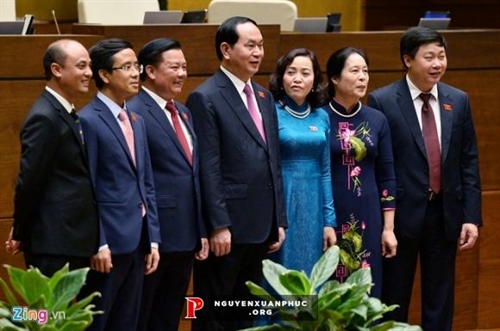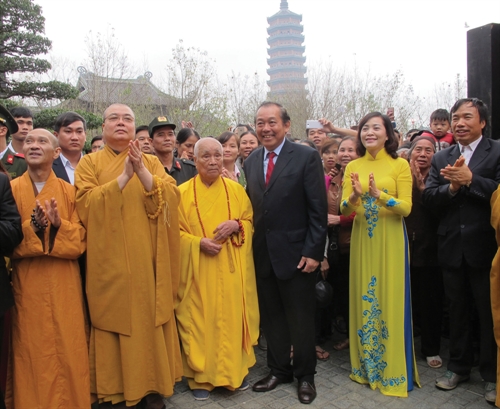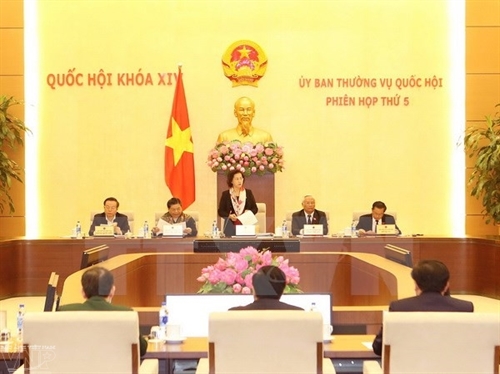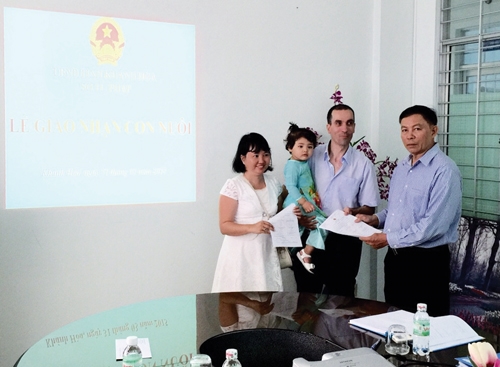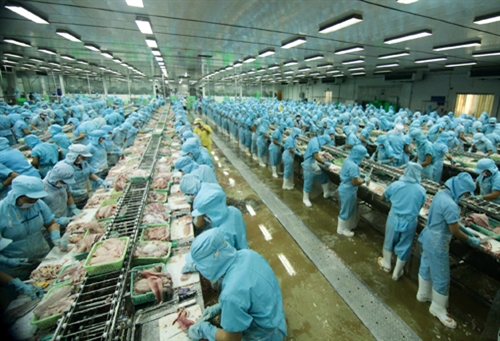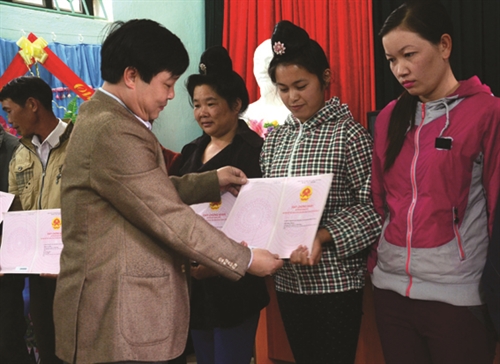A list of 114 good regulations and 123 bad regulations was selected among 9,297 nominations sent in by people and organizations from many state agencies, associations and the business community in response to the rating of regulations concerning business activities first ever launched in Vietnam.
The above result was announced at a seminar held by the Vietnam Chamber of Commerce and Industry (VCCI) 14 months after the launch of the rating in December 2015, which aims to applaud good regulations and point out inappropriate ones for change.
A panel of 16 experienced business law experts was formed to pick out the list based on 10 criteria for assessment of laws and regulations, said Dau Anh Tuan, Director of VCCI’s Legal Department at the seminar.
The criteria include necessity, rationality, consistency, enforceability, transparency, compliance cost, guarantee of business freedom, promotion of competition, control of harassment, and compliance with regulations concerning promulgation and effect of legal documents.
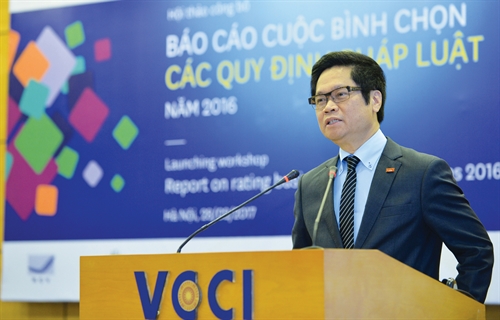 |
| VCCI Chairman Vu Tien Loc addresses the workshop on February 28 launching a report on rating good and bad regulations of 2016__Photo: https://vcci.com.vn |
“Of these 237 nominated regulations, 79 lie in laws, accounting for 33 percent; 75 belong to decrees, making up 32 percent, 69 lie in circulars, representing 29 percent, and the rest come from other documents.”
“If classified by good or bad category, laws account for to 34 percent of nominations for good regulations and just 24 percent of nominations for bad regulations, while sub-laws make up for 70 percent of nominations for bad regulations,” Tuan said.
This showed that, from the view of the business community, the quality of sublaws, including decrees and circulars, is poorer than that of laws, Tuan noted.
According to VCCI, the rating was conducted to gather feedbacks from the business community on legal regulations and policies, a task assigned to VCCI by the Government in the two resolutions on improving the business environment - Resolution No. 35 of 2016 and Resolution No. 19 of 2017.
Its outcomes will be presented at a meeting to be held later this year between the Prime Minister and the business community.
Based on the above list, a shortlist of 30 best regulations and 30 worst regulations was presented at the seminar. However, according to VCCI’s representative, by December 2016, five of these bad regulations had been amended and many others are being considered for amendment.
List of 30 best regulations
1. Abolishing the crime of conducting illegal business (the 2015 Penal Code);
2. Issuing a list of trades and sectors banned from business investment or subject to conditional business (the 2014 Investment Law);
3. Removing the 15-percent cap on businesses’ advertising, marketing, and sales promotion activities (the 2014 Law on Corporate Income Tax);
4. Annulling the regulation requiring real estate businesses to sell houses and construction works via real estate trading floors (the 2014 Law on Real Estate Business);
5. Reducing the tax declaration frequency from once a month to once a quarter for enterprises earning a turnover of between VND 200 million and VND 500 million (Decree No. 91/2014/ND-CP);
6. Exempting domestic investors from all investment procedures, except cases of investing in projects subject to investment approval (the 2014 Investment Law);
7. Permitting the use of charter capital as proof of satisfaction of the regulation on the legal capital for conducting real estate business and exempting real estate businesses from registering for determination of the required legal capital amount (Decree No. 76/2015/ND-CP);
8. Granting house ownership rights to foreigners like Vietnamese citizens (the 2014 Housing Law);
9. Implementing the principle of precedence in application of investment conditions to foreign investors (Decree No. 118/2015/ND-CP);
10. Annulling the requirement on practice certificates and certification of legal capital in dossiers of application for establishment of enterprises (the 2014 Enterprise Law);
11. Permitting foreign investors to buy less than 51 percent of shares or capital contributions at enterprises operating in non-conditional business areas without having to carry out investment registration procedures (the 2014 Investment Law);
12. Expanding the scope of real estate business operations of overseas Vietnamese and foreign-invested enterprises (the 2014 Law on Real Estate Business);
13. Increasing speed limits and safety distances applicable to motor vehicles (Ministry of Transport Circular No. 91/2015/TT-BGTVT);
14. Allowing enterprises to use self-printed invoices if receiving no reply from tax offices within five days after submitting a request therefor and placing responsibility for the failure to give such a reply on heads of tax offices (Ministry of Finance Circular No. 26/2015/TT-BTC);
15. Expanding the eligibility to social housing support to employees of enterprises located inside or outside industrial parks and households and individuals subject to land recovery or house relocation or dismantlement under law but not yet allocated residential land or houses as compensation (the 2014 Housing Law);
16. Permitting a person to concurrently act as director of more than one joint stock company (the 2014 Enterprise Law);
17. Reducing the ordinary corporate tax rate from 25 percent to 22 percent from January 1, 2014, and to 20 percent from January 1, 2016 (the 2013 Law Amending a Number of Articles of the Law on Corporate Income Tax);
18. Eradicating the routing of health insurance-covered medical examination and treatment (the 2014 Law on Health Insurance);
19. Permitting a limited liability company or joint stock company to have more than one at-law representative (the 2014 Enterprise Law);
20. Permitting insurance businesses to open branches in the Vietnamese territory (Ministry of Finance Circular No. 194/2014/TT-BTC);
21. Permitting the hire and hire-purchase of future real estates (the 2014 Law on Real Estate Business);
22. Simplifying procedures for registration and establishment of cooperatives to be similar to those for establishment of enterprises (Ministry of Planning and Investment Circular No. 03/2014/TT-BKHDT);
23. Shifting the function of providing training for transport business executives to business associations (Ministry of Transport Circular No. 60/2015/TT-BGTVT);
24. Exempting construction permits for under-7-story houses with a floor area of under 500 square meter which are built under urban or housing development projects whose 1:500-scale detailed plans have been approved by competent authorities (the 2014 Construction Law);
25. Removing the chapter on insurance contracts (the 2015 Civil Code);
26. Prohibiting courts from refusing to settle civil cases for reason of unavailability of applicable laws (the 2015 Civil Code and 2015 Civil Procedure Code);
27. Increasing the agricultural land assignment duration from 20 years to 50 years (the 2013 Land Law);
28. Lessening the conditions for convening a general assembly of shareholders (the 2014 Enterprise Law);
29. Setting clear principles on investment procedures: (i) to refrain from requiring additional papers other than prescribed ones (ii) to request dossier supplementation only once, and (iii) to regard consulted units’ failure to reply as consent (Decree No. 118/2015/ND-CP); and
30. Permitting disinvestment below par value or book value upon equitization of state-owned enterprises or divestment of state capital (Prime Minister Decision No. 51/2014/QD-TTg).
List of 24 worst regulations
1. Disallowing printing establishments to coordinate with others in conducting lay-out designing, printing and post-print processing (Decree No. 60/2014/ND-CP);
2. Requiring the inclusion of detailed terms on the category, quantity, quality and shelf life of personal protective equipment in labor contracts (Decree No. 05/2015/ND-CP);
3. Requiring petrol and oil traders to seek agreement from fuel dispenser sellers before hiring others to repair fuel dispensers with devices sealed with lead seals (Ministry of Science and Technology Circular No. 15/2015/TT-BKHCN);
4. Requiring enterprises to declare the grade-4 codes of their trades or sectors when carrying out enterprise establishment procedures or investment procedures (Decree No. 78/2015/ND-CP);
5. Requiring enterprises to seek approval from state agencies for their price declarations (Ministry of Finance Circular No. 16/2014/ND-CP);
6. Requiring enterprises to apply for a certificate of changes in business registration contents (Decree No. 78/2015/ND-CP);
7. Requiring owners of offshore investment projects to seek permission from state agencies before carrying out procedures to terminate their projects (Decree No. 83/2015/ND-CP);
8. Requiring import permits for a number of machines and equipment for post-print processing (Decree No. 60/2014/ND-CP);
9. Requiring public notary offices to change their names if relocating their head offices (the 2014 Law on Notary);
10. Requiring business licenses for doing cargo transport business without direct collection of freights (Ministry of Transport Circular No. 63/2014/TT-BGTVT);
11. Imposing certain conditions on heads of printing establishments (Decree 60/2014/ND-CP);
12. Requiring passenger cars of 9 seats or less to be equipped with fire extinguishing devices (Ministry of Public Security Circular No. 57/2015/TT-BCA);
13. Allowing each pesticide trader to register only one active ingredient concentration for each form of a finished-product pesticide (Ministry of Agriculture and Rural Development Circular No. 21/2015/TT-BNNPTNT);
14. Requiring printing establishments to record and keep information on the acceptance of orders for layout designing, printing and post-print processing according to set forms (Decree 60/2014/ND-CP);
15. Prohibiting the use of color photocopiers for commercial purposes (Decree 60/2014/ND-CP);
16. Permitting the import of goods of plant origin on the basis of exporting countries’ registration of import with Vietnam (Ministry of Agriculture and Rural Development Circular No. 12/2015/TT-BNNPTNT);
17. Restricting the rates of Vietnamese students at foreign-invested education institutions (Decree 72/2012/ND-CP);
18. Requiring shipping agents to have legal staffs (Decree 30/2014/ND-CP);
19. Requiring traders importing passenger cars of 9 seats or less to obtain letters of authorization from manufacturers (Ministry of Industry and Trade Circular No. 20/2011/TT-BCT);
20. Requiring enterprises providing passenger transport services to have a certain number of cars (Decree No. 86/2014/ND-CP);
21. Disallowing accounting service enterprises to be organized in the form of joint stock company and requiring at-law representatives and directors or directors general of limited liability companies operating in the accounting sector to be practicing accountants (the 2015 Accounting Law);
22. Imposing certain conditions for establishment of social networks (Circular 09/2014/TT-BTTTT);
23. Requiring households engaged in nomadic business or mobile business to send notices to tax offices and market management agencies of the localities where they register their head offices and where they conduct business activities (Decree No. 78/2015/ND-CP);
24. Restricting an employee’s maximum overtime hours at 200 hours per year (the 2012 Labor Code).- (VLLF)
